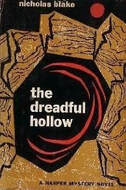My first Forgotten Book of 2025 is The Dreadful Hollow, first published in 1953. This is an interesting and bold attempt by Nicholas Blake (the crime writing alter ego of Cecil Day-Lewis) to fuse classic ingredients of traditional detection (brilliant consulting detective, an outbreak of poison pen letters in a seemingly idyllic English village, an enigmatic person in a wheelchair, an unpleasant financier, a likeable vicar, and so on) with the psychologically complex, character-driven crime novel which was coming into fashion at the time.
Blake was an accomplished writer, and this is a very readable book. The structure is striking and unusual. At the start of Part One, Sir Archibald Blick hires Nigel Strangeways to find out who is sending poison pen letters in the Dorset village of Prior's Umborne, where both Blick's sons live. This investigation takes up half the book. And then, at the end of Part One, almost out of the blue, someone is murdered in the village. So Part Two is devoted to Strangeways' attempt to solve that crime.
There are several oddities, it must be said. Sir Archibald is, we're told (and later reminded, more than once) very keen on eugenics (one might have assumed this had become deeply unfashionable by 1953) and he keeps in his office a photograph of a naked woman. Neither of these striking features of the first chapter have any real significance in the story. And I did find some of the suspects irritating in the extreme, which reduced my interest. There are also one or two plot points that I didn't find convincing, including an incident involving boobytrapped binoculars - though it was certainly dramatic.
Having said that, there was enough in this book to keep me interested throughout, and the final chapter is strong enough to help overcome one's reservations about some of the earlier scenes. I thought that the interplay between Nigel and the police officers was particularly well done; it isn't easy to justify an outsider's involvement in an official investigation in a crime novel that strives for a degree of realism. The title comes from Tennyson's poem 'Maud', as do some of the chapter headings, but I must admit that I'm not clear how the poem relates to the story, if at all. But then, there's an untranslated Latin quotation on the first page of the story and it may be that Day-Lewis was even more of a literary elitist than his Detection Club colleague Dorothy L. Sayers. Not to worry, though. This is an ambitious book, and although I wouldn't say it's wholly successful, I was interested to watch the way the author painted himself into several corners during the course of the story and then managed, with quite a bit of skill, to get out of them.

4 comments:
I enjoyed all of the Nicholas Blake novels thirty years ago. Need to revisit.
I've come back to them recently, Patti, after quite a gap, and have been enjoying the variety as well as the writing.
I've always felt (and may someday write a blog entry on this...if I ever get around to starting a blog), that Nicholas Blake wrote the best first halves of detective novels of anyone--well plotted, intriguing premises, interesting characters, plenty of humour, and small parts of the mystery solved (by interpretation of clues) as you go along, instead of an information dump in the last chapter when the sleuth explains everything (not that I object to that, but I find it more rewarding if you get some answers along the way). But to me, the latter parts of his novels often become cluttered, too serious, and strain even my (usually elastic) willing suspension of disbelief. I too found parts of this novel irritating, and guessed the "surprise ending" too soon, but I enjoyed it on the whole, as I do most of Blake's books (I think his early THOU SHELL OF DEATH and THE BEAST MUST DIE are his best, but there are many good later books, such as MINUTE FOR MURDER and END OF CHAPTER). I too liked the last chapter of THE DREADFUL HOLLOW, which has an unusual structure, despite the melodrama at the end. (It just occurred to me that a lot of Blake's characters fall to their deaths at the end of his books.)
Excellent analysis, Arthur, thank you. I do encourage you to write this up on a blog or somewhere - and if you want to do a guest post for this blog, you will be most welcome.
Post a Comment